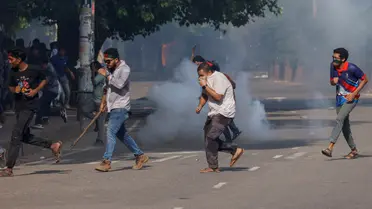These protests, predominantly led by Bangladeshi youth and students, suggest a lack of understanding of the long-term repercussions of such movements

Shivaji Sarkar
The ongoing unrest in Bangladesh is not merely a conflict of religion; it represents a deeper and more complex confrontation, striking at the heart of India’s long-standing external affairs strategy. This turbulence threatens to undermine India’s geopolitical and economic interests in unprecedented ways. The situation escalated when Indian opposition leader Suvendu Adhikari led protests blocking goods vehicles heading to Bangladesh, highlighting simmering discontent over cross-border trade. In response, protests erupted in Bangladesh against Indian-made and exported goods—a striking, if not entirely rational, retaliation from a nation that relies heavily on India for economic and strategic support.
These protests, predominantly led by Bangladeshi youth and students, suggest a lack of understanding of the long-term repercussions of such movements. However, the alarming aspect is the Bangladeshi government’s inability—or unwillingness—to rein in these protests or articulate a clear stance. Adding to the unease are recent incidents involving Turkish-made Bayraktar TB2 drones monitoring Indian territories like Meghalaya and West Bengal. This development underscores a calculated and deliberate strategy, far beyond mere reactionary politics.
Surprisingly, this emerging threat does not appear to stem from traditional adversaries like Pakistan or China. Instead, it seems to be orchestrated by Turkey, which has been increasingly assertive in its influence over Bangladesh. Advanced surveillance tactics and the growing economic and military ties between Dhaka and Ankara point to a new axis of interest that challenges India’s regional dominance. This unfolding scenario is a bilateral concern and a harbinger of broader geopolitical shifts, demanding India’s immediate and strategic response.
Bangladesh-Turkey Nexus
The recent developments along the India-Bangladesh border, marked by the detection of Turkish Bayraktar TB2 drones, signify an alarming shift in regional dynamics. These drones, identified using transponder codes like TB2R1071, were spotted flying over Meghalaya and West Bengal. Controlled from Dhaka’s Bashar air base and reportedly deployed at the Zahurul Haque Air Force Base in Chittagong, their presence points to a growing pattern of UAV activity emanating from Bangladesh. The Bayraktar TB2, a cutting-edge Turkish-manufactured drone capable of extended flights, high-definition video capture, thermal imaging, and combat functionality, underscores the deepening defence ties between Turkey and Bangladesh.
The implications for India are profound, particularly given that Turkey’s growing influence in Bangladesh seems to be accompanied by a surge in anti-India sentiments within the neighbouring nation. The banned extremist group Hizb-ul-Tahrir has been circulating pamphlets in Dhaka, labelling India as an adversary and advocating for the establishment of a South Asian caliphate. These developments reflect a coordinated narrative aimed at fostering hostility toward India, further complicated by protests against Indian goods in Bangladesh. This situation presents a multidimensional challenge for New Delhi as it grapples with deteriorating relations and security concerns along its eastern border.
To address the tensions, India’s Foreign Secretary Vikram Misri recently visited Bangladesh. However, the damage caused by the escalating anti-India rhetoric, compounded by incidents like drone surveillance and hostile propaganda, has complicated diplomatic efforts. West Bengal Chief Minister Mamata Banerjee has also called on the Indian government to act decisively, urging the protection of minorities in Bangladesh, where Hindu communities have faced attacks across multiple districts following the political turmoil after Sheikh Hasina’s government lost power. Banerjee’s plea reflects growing domestic concerns about the humanitarian and geopolitical fallout of these developments.
The unrest in Bangladesh cannot be viewed in isolation; it stems from a complex web of historical, political, and diplomatic factors. Turkey and Bangladesh have maintained largely cooperative relations since 1974, with Turkey playing a significant role in Bangladesh’s state-building efforts. Over time, the partnership has evolved, with Turkey providing substantial aid and technical expertise. While their ties experienced a brief strain in the 2010s due to Turkey’s Islamist political leanings and open support for Bangladesh’s Jamaat-e-Islami Party, they have since normalized relations. This partnership has been further cemented through Turkey’s active engagement in humanitarian and economic projects in Bangladesh, particularly during the Rohingya refugee crisis.
Turkey’s growing footprint in Bangladesh, especially in the defense sector, aligns with Ankara’s broader geopolitical ambitions in South Asia. Its military exports, including the Bayraktar TB2 drones, exemplify how these ties could shift the balance of power in the region. While Pakistan and China have often been viewed as strategic concerns for India, the recent developments highlight Turkey as an emerging player whose actions could significantly influence the geopolitical landscape.
As the situation unfolds, India faces the challenge of navigating these intricate dynamics through a mix of diplomatic engagement and strengthened border security, ensuring its interests remain safeguarded in an increasingly volatile region.
Rift to Collaboration
The 2010s witnessed an unusual diplomatic rift between Turkey and Bangladesh, primarily driven by ideological and political differences. Turkey’s Justice and Development Party (AKP), under Recep Tayyip Erdoğan, adopted a political Islamist stance in 2011, forging ties with the global Muslim Brotherhood network, including Bangladesh’s Jamaat-e-Islami. This alliance led to tensions when Turkey criticized Bangladesh’s handling of 1971 war crimes trials. In 2012, Turkish President Abdullah Gül’s appeal for clemency for Jamaat leaders was dismissed by Dhaka. Matters escalated in 2016 when Turkey vehemently opposed the execution of Motiur Rahman Nizami, the Jamaat leader, prompting a diplomatic standoff.
Amid these tensions, the Gülen Movement became a point of contention. Following Turkey’s designation of the movement as a terror organization, Ankara pressed Dhaka to ban Gülen-affiliated institutions, particularly the International Turkish Hope School (ITHS). However, Bangladesh resisted, citing diplomatic norms and property rights. Instead of complying with Turkey’s demand to transfer Gülen schools to its Maarif Foundation, Bangladesh facilitated the sale of these institutions to local communities, navigating the issue without disrupting ties.
Despite these challenges, the economic and security interests of both nations encouraged reconciliation. The Rohingya crisis served as a turning point. Following the 2016 violence in Myanmar’s Rakhine State, over 600,000 Rohingyas sought refuge in Bangladesh, adding to the existing population of 250,000 undocumented Myanmar nationals. This humanitarian crisis highlighted the necessity for international cooperation, creating an opportunity for Turkey and Bangladesh to mend relations.
Turkey launched an active diplomatic campaign to bring global attention to the Rohingya issue through platforms like the United Nations, the G20, NATO, and the Organisation of Islamic Cooperation (OIC). Ankara supported Dhaka’s efforts for the safe repatriation of the Rohingyas and offered significant humanitarian aid. Turkish organizations, including the Turkish Cooperation and Coordination Agency (TIKA), the Disaster and Emergency Management Authority (AFAD), and the Turkish Red Crescent, played a pivotal role in assisting Rohingya refugees.
In Cox’s Bazar, Turkey established camps, hospitals, schools, and orphanages to alleviate the suffering of refugees and impoverished locals. TIKA distributed hot meals to 25,000 Rohingyas daily and provided medical supplies to combat the COVID-19 pandemic. Furthermore, Ankara supported Dhaka in relocating Rohingya refugees to Bhashan Char Island, demonstrating a commitment to long-term solutions.
The collaborative efforts significantly improved diplomatic ties. Visits by Bangladeshi President Md. Abdul Hamid and Turkish Prime Minister Binali Yıldırım in 2017 marked the normalization of relations. By 2021, bilateral relations had reached unprecedented levels, with high-level engagement across economic, security, and humanitarian spheres.
The evolving partnership underscores the ability of shared challenges, such as the Rohingya crisis, to bridge ideological divides. While the past decade revealed the strains between Ankara and Dhaka, the focus on mutually beneficial cooperation has ushered in a phase of strengthened ties, positioning Turkey as a key ally for Bangladesh in managing humanitarian and regional challenges.
Strategic Defence Partnerships
The burgeoning military and defence industry cooperation between Turkey and Bangladesh underscores a crucial dimension of their evolving bilateral relationship. This development connects with broader economic and political engagements, reflecting mutual interests that extend beyond commerce to strategic alliances.
Historically, Bangladesh has diversified its military imports from countries such as Russia, China, and the United States. Recently, however, it has increasingly turned to Turkey for advanced military equipment, aligning with Ankara’s ambitions to establish itself as a key player in the global defence industry. The collaboration gained momentum in 2013 when Turkey supplied Otokar Cobra light armoured vehicles to the Bangladeshi Army. Subsequent agreements, including a major 2017 contract awarded to Turkish Delta Defence for 680 light armoured vehicles, have fortified these ties. Further deals, such as the supply of medium-range guided rocket launchers by ROKETSAN in 2019, highlight the trust Bangladesh places in Turkey for critical defence systems.
Military training programs and joint exercises deepen this strategic partnership. Bangladesh’s naval forces maintain close links with Turkey, benefiting from advanced training facilitated by NATO-member expertise. The country’s most elite naval unit, SWADS, has received specialized training from Turkish counterparts, alongside support from South Korea and the United States. In 2019, Bangladeshi officials, including the Chief of Army Staff, actively participated in Turkey’s high-profile Winter-2019 military exercises, showcasing the growing defence rapport between the two nations.
Turkey’s defence cooperation with Bangladesh extends beyond weapons sales to modernization and peacekeeping missions. A contingent of Bangladeshi military personnel was deployed to Turkey in 2021 for advanced training, particularly in preparation for UN peacekeeping operations. Such exchanges are expected to grow, with Bangladesh expressing interest in Turkey’s expertise in sophisticated defence systems and high-quality training. The recent involvement of Bangladeshi army officials in Turkish Aerospace Industries and the Unmanned Aerial Systems sector underscores Bangladesh’s intent to leverage Turkish advancements in military technology.
However, this promising collaboration faces challenges. Turkey’s strained relations with its NATO allies, particularly following its acquisition of Russian S-400 missile systems in 2019, have led to significant sanctions. The United States imposed measures under the CAATSA framework, excluding Turkey from the F-35 fighter jet program and halting the export of critical components to Turkish defence firms. For instance, a $1.5 billion contract with Pakistan for T129 ATAK helicopters collapsed due to the unavailability of U.S.-made engines.
Such sanctions pose potential hurdles for Turkey’s defence contracts with Bangladesh. Although Turkey’s defence products offer competitive pricing and high functionality, reliance on imported software and engines from NATO allies could limit their feasibility. Despite these challenges, the defence cooperation between Turkey and Bangladesh reflects a strategic alignment driven by shared goals and mutual benefits, further solidifying their bilateral partnership within the broader regional context.
This strategic dimension, alongside economic and humanitarian collaborations, positions the Turkey-Bangladesh relationship as multifaceted and forward-looking, setting a foundation for enduring ties amid global geopolitical shifts.
A Critical Reflection
The ongoing developments highlight the urgency for comprehensive reforms that address the deep-rooted issues facing society today. From economic disparities to political turbulence, the challenges are multifaceted and require coordinated efforts from both policymakers and the public. It is evident that sustainable solutions demand not only policy changes but also a shift in societal attitudes and behaviors.
The role of leadership in navigating these challenges cannot be overstated. Leaders must exhibit a keen understanding of the complexities involved and prioritize the welfare of all citizens, particularly the most vulnerable. Political leaders must work toward fostering unity and addressing the concerns of marginalized groups, ensuring that no one is left behind.
Moreover, the need for informed public engagement is more crucial than ever. Citizens must actively participate in shaping policies and hold governments accountable for their actions. Engaging in constructive dialogues and supporting transparent practices will pave the way for a stronger democracy and a more equitable society.
In essence, while the road ahead is fraught with obstacles, there remains hope. Through collective action, open-mindedness, and a steadfast commitment to justice, society can move toward a future where everyone’s rights are respected, and opportunities are accessible to all. The path to progress may be long and challenging, but it is not without its rewards, especially when all stakeholders work in tandem toward common goals.
( Author is a Professor in Indian institute of Mass Comunication)


